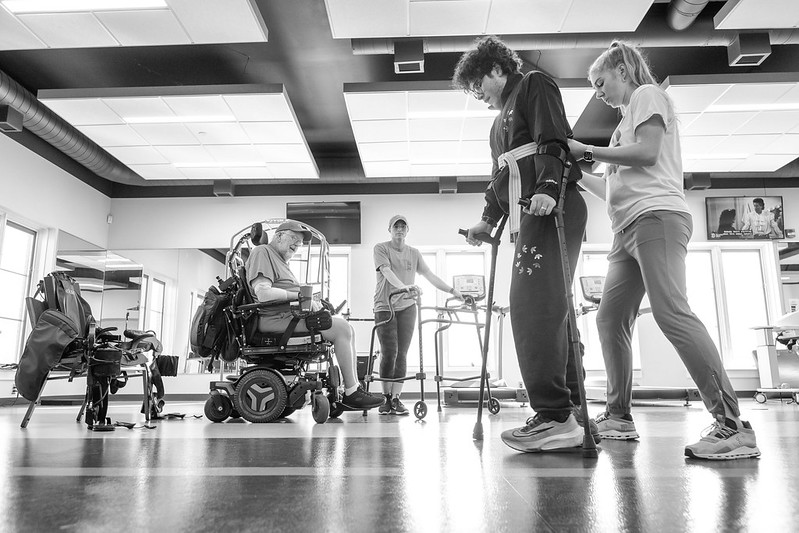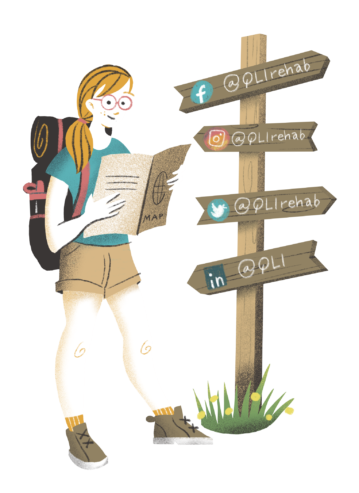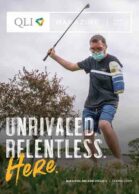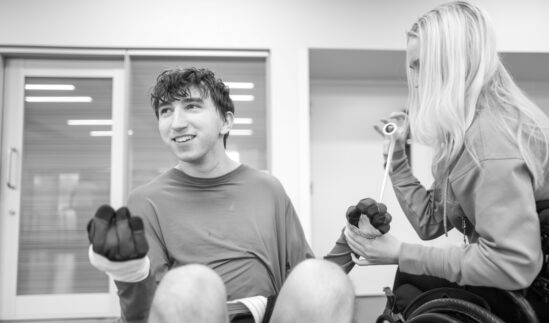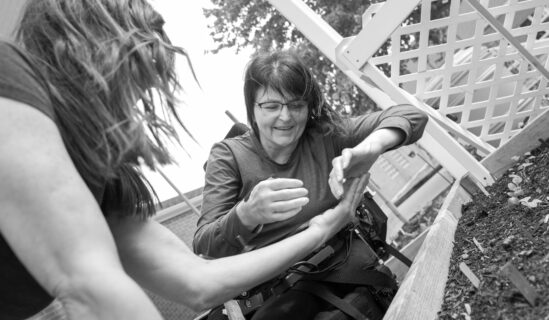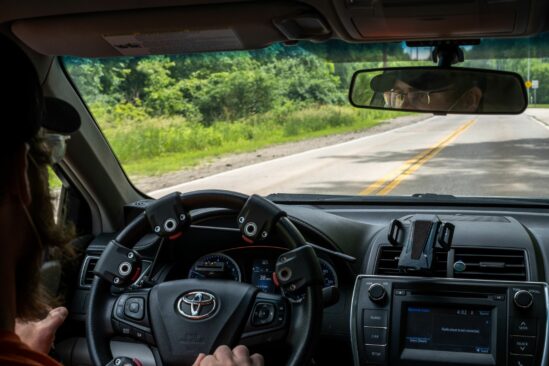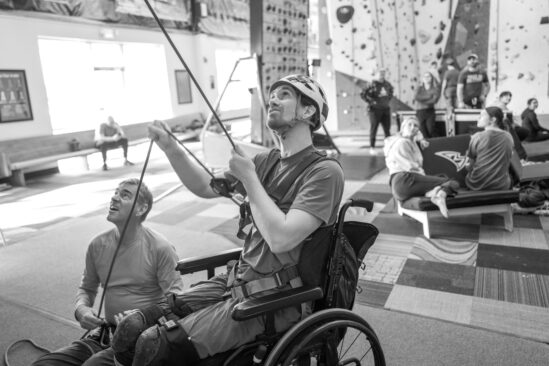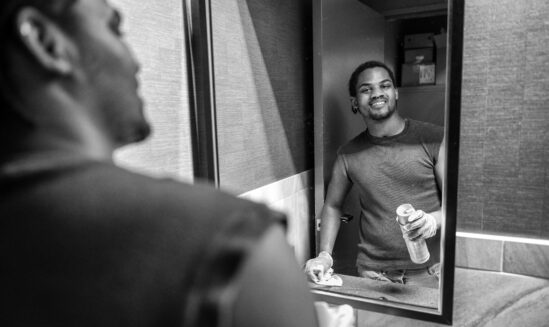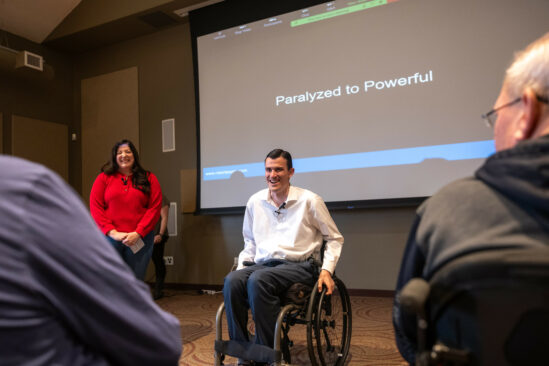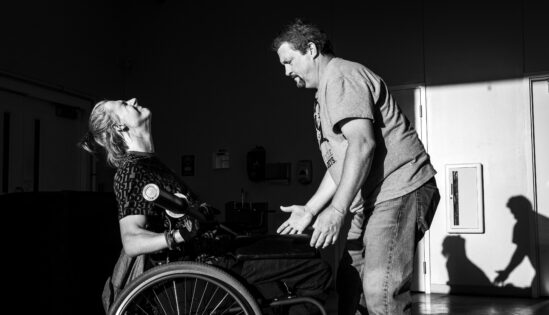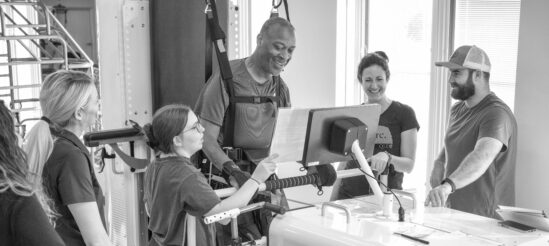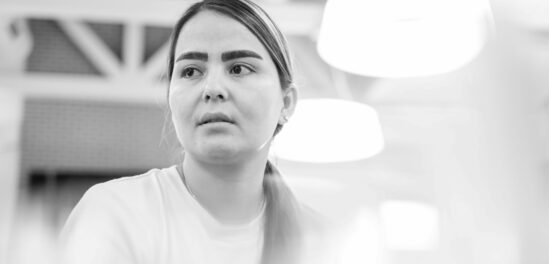Beginning on an incline, the wheelchairs move swiftly down the pavement. Thirty yards later, Pato Gilchrist and Seth Wannamaker bring their chairs to an abrupt halt. They turn around, looking back at the outer wall of the Lied Life Center. For Pato, this is his last session of the day. Above, the sun is beginning to make its slow, late-summer descent.
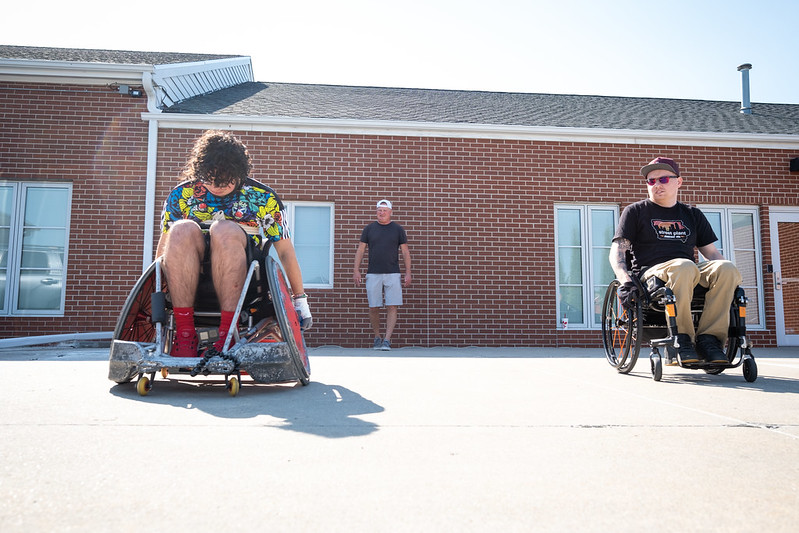 He takes a deep breath and swivels his chair. He wheels the chair backward up the incline, willing his body and his mind to overcome this challenge. Each push takes a considerable amount of energy. The exercise demands concentration—Pato must fight against the pull of gravity and momentum that would cause the chair to go fast down the hill without resistance.
He takes a deep breath and swivels his chair. He wheels the chair backward up the incline, willing his body and his mind to overcome this challenge. Each push takes a considerable amount of energy. The exercise demands concentration—Pato must fight against the pull of gravity and momentum that would cause the chair to go fast down the hill without resistance.
__
2023 was building to be an exciting year for Patricio “Pato” Gilchrist. A senior in high school, his sights were set on the future, foremost the thought of going to college at the University of Oregon to major in environmental science. For some, heading far from home might bring some anxiety. But Pato, someone with fierce determination and a highly competitive spirit, wasn’t shaken or daunted by the prospect. He ran toward the future full bore.
__
The video, pulled up on Pato’s phone, depicts a cool, early spring day. “It was late April,” remembers Pato. “We seniors didn’t have school that day, so a few of us decided to spend some time on Lake Michigan. We brought paddle boards, the works.” The group of friends set up at a dock on the lake. Pato and one of his friends were the first to go into the water.
Only ten seconds long, and without further context, the video seems very unremarkable. One friend jumps into the water, and Pato follows, diving in. His friend comes out of the water quickly. Pato remains under the water, but the video ends before anyone knows that something is very wrong.
“They thought at first that I was just messing with them,” Pato details. “I noticed I couldn’t move my body—I was stuck underwater, and tried to conserve my oxygen as best as I could.”
Pato’s rehabilitation journey took him first to Shirley Ryan AbilityLab in Chicago, IL. He was able to graduate high school but his plans for the fall had shifted from travel or college to larger questions like if he would walk again.
The one thing that remained consistent was a massive support system of family and friends. By the time he came to QLI in July 2023, his goal was clear—to push the boundaries and see just how far he could progress.
That progress grew by leaps and bounds in the following months, supported by his clinical and residential teams. But Pato’s progress took on an additional facet after spending time with Seth Wannamaker, a QLI graduate and one of a network of peer mentors. For Pato, this mentoring support came with a unique spin—wheelchair rugby, also affectionately known as “Murderball.”
__
“I could tell right away when I met Pato that he had an intense competitive side,” says QLI Life Path Specialist Jack Mahaffey. Knowing that Pato came from a varsity soccer background and that he had heard about wheelchair rugby while at Shirley Ryan AbilityLab, Jack broached the idea of training. Pato was completely on board.
The sport itself offers numerous benefits for clients. On a physical level, the broad wheels of the chairs and the fast pace of play through which they are wheeled demand a high level of arm strength. Players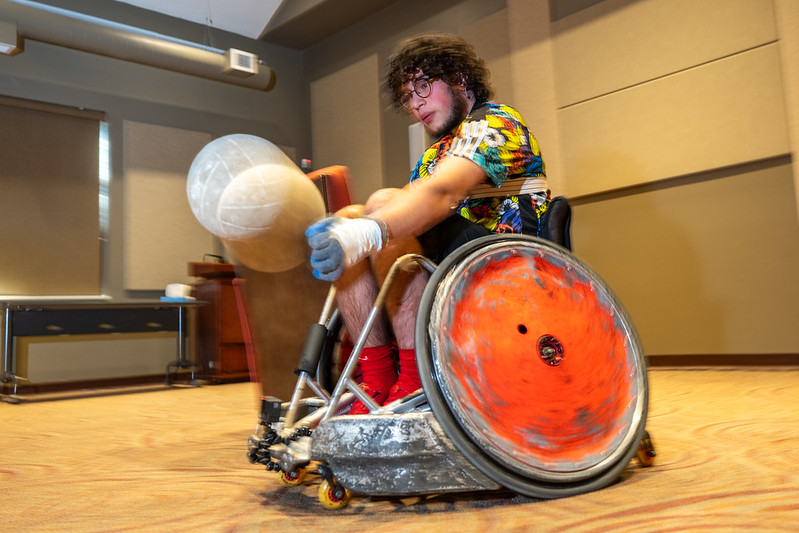 must be able to quickly react to catch passes or change routes as they anticipate paths opposing team members may take. They need to not only navigate the court but simultaneously position the chair and bring their arms up to catch a pass. It is both physically and mentally challenging and a lot to navigate in a split-second time. Through this practice, the player’s core will gain strength which further aids them in gait training.
must be able to quickly react to catch passes or change routes as they anticipate paths opposing team members may take. They need to not only navigate the court but simultaneously position the chair and bring their arms up to catch a pass. It is both physically and mentally challenging and a lot to navigate in a split-second time. Through this practice, the player’s core will gain strength which further aids them in gait training.
“Wheelchair rugby has given Pato practical ways to improve physically and challenges him to find motivation and establish exercise routines that he may not have done otherwise,” says occupational therapist Sara Waid. “For example, through his drills with Jack, he realized how beneficial it is to his reaction time and speed if he keeps his head up when preparing to catch passes. That also means he’s getting a great and sustained cervical extension.” Additionally, Pato’s innate competitive edge has led him to seek out more time to work on cardio and endurance training outside of his regular therapy sessions.
On a mental and emotional level, engaging in the sport can reinvigorate the spirit, and being on a team builds a sense of community and camaraderie among peers. Pato also gains the benefit of time with fellow QLI graduates and rugby players, Seth and Marty Ewing.
Seth, a client in 2018, found his competitive spirit reignited when opportunities came about to pursue go-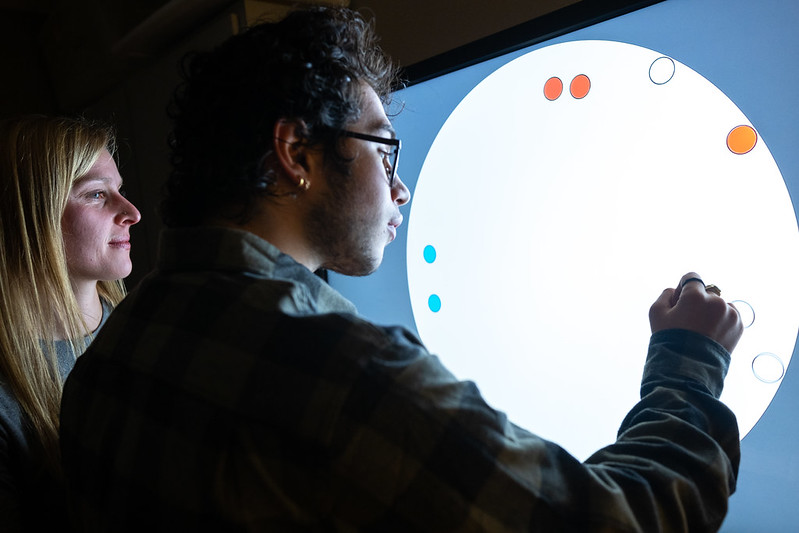 kart racing. After his discharge, he has become a mentor for clients with spinal cord injuries. In mentoring Pato, Seth has joined his training sessions with Jack, providing an additional perspective on how to set up challenges along the courses Pato navigates, doing drills with Pato, or the optimal seating position and posture for Pato in his chair.
kart racing. After his discharge, he has become a mentor for clients with spinal cord injuries. In mentoring Pato, Seth has joined his training sessions with Jack, providing an additional perspective on how to set up challenges along the courses Pato navigates, doing drills with Pato, or the optimal seating position and posture for Pato in his chair.
Marty, a client in 2019, pursued wheelchair rugby with Jack and was the first client to continue his pursuit of the sport on the team level. Over the past few years, he has become a rising star on both the Chicago Bears rugby team and the USA national team. With hopes to join the 2024 Paralympic team, Marty has set a precedent that Pato hopes to match and possibly exceed. “With Pato planning to discharge back to the Chicago area, we’ve got things in motion to pursue getting him on the Chicago team,” says Jack.
During Pato’s training sessions with Jack, Marty will often Zoom with the duo, offering advice and encouragement to Pato. Along with the in-person support from Jack and Seth at QLI, Marty will be a great continued mentor for Pato after he graduates and returns home to Chicago.
__
“Thirty seconds. I know you can do it Pato.” A week later, it’s a controlled course. Three chairs have been placed in the Lied Life Center auditorium in a disjointed pattern. Weaving in and out in a series of fast movements is just the first part of the course. The second is all about reaction time. Jack, on the last turn, will spike the ball towards Pato. After catching the ball, Pato rolls the chair forward with two swift pushes of the oversized angled wheels, passing it off to Jack again.
“Now go!” says Jack. “Get out of here, quick!”
Pato rolls and rolls, coming to a swift halt at the auditorium entrance, after this tenth run of the course.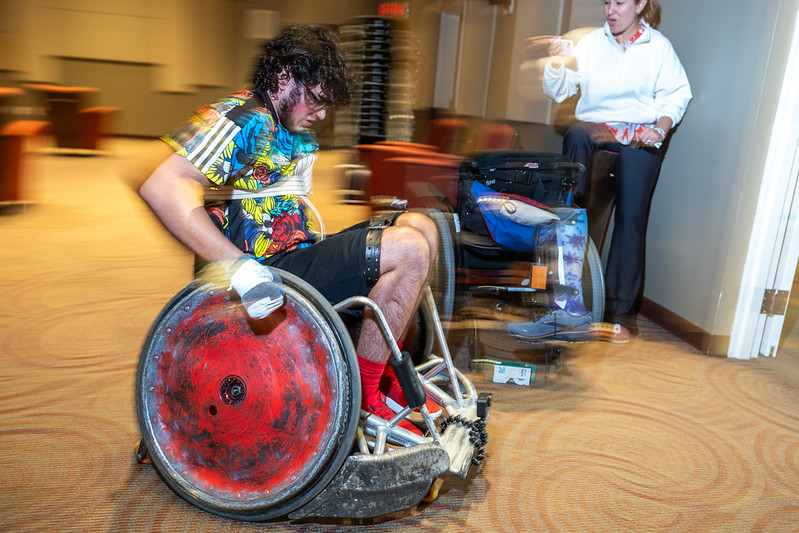
Seth is keeping time of the exercise. “About 31 seconds,” he says.
“Good,” says Jack. “Making progress a bit at a time. I bet you’ll get under 30 next week.”
Pato hesitates, then gives a sly look. “How about one more run-through, right now?”
“Got enough still in you?”
“Oh yeah,” says Pato. “I sure do.”
The next run practically defies reality. Twenty minutes of that intense course would be enough to wear out even the toughest competitors. Pato navigates the course and races to the finish. He waits to hear the time.
“It’s not thirty seconds,” begins Seth. Concealing the time, he reveals it after a beat—29.88 seconds.
__
“For me,” says Pato, “wheelchair rugby provides that competitive release that I’ve pursued through sports all my life. My injury hasn’t changed who I am. Whatever I want to do with life, I have a voice.”
“I can certainly foresee Pato becoming a mentor for future QLI clients,” says Jack. “He has such an infectious personality and determination. To be as positive as he has been and look at obstacles and hurdles with an acknowledgment that it may be difficult but he’ll find a way through it, a way that works for him. It’s a mindset that would be so helpful to other young men and women going through our program.”
Pato’s future will most definitely be the extension of how he thrived at QLI—pushing limits, seizing goals, and looking forward to the difficult things ahead with a grin on his face.
